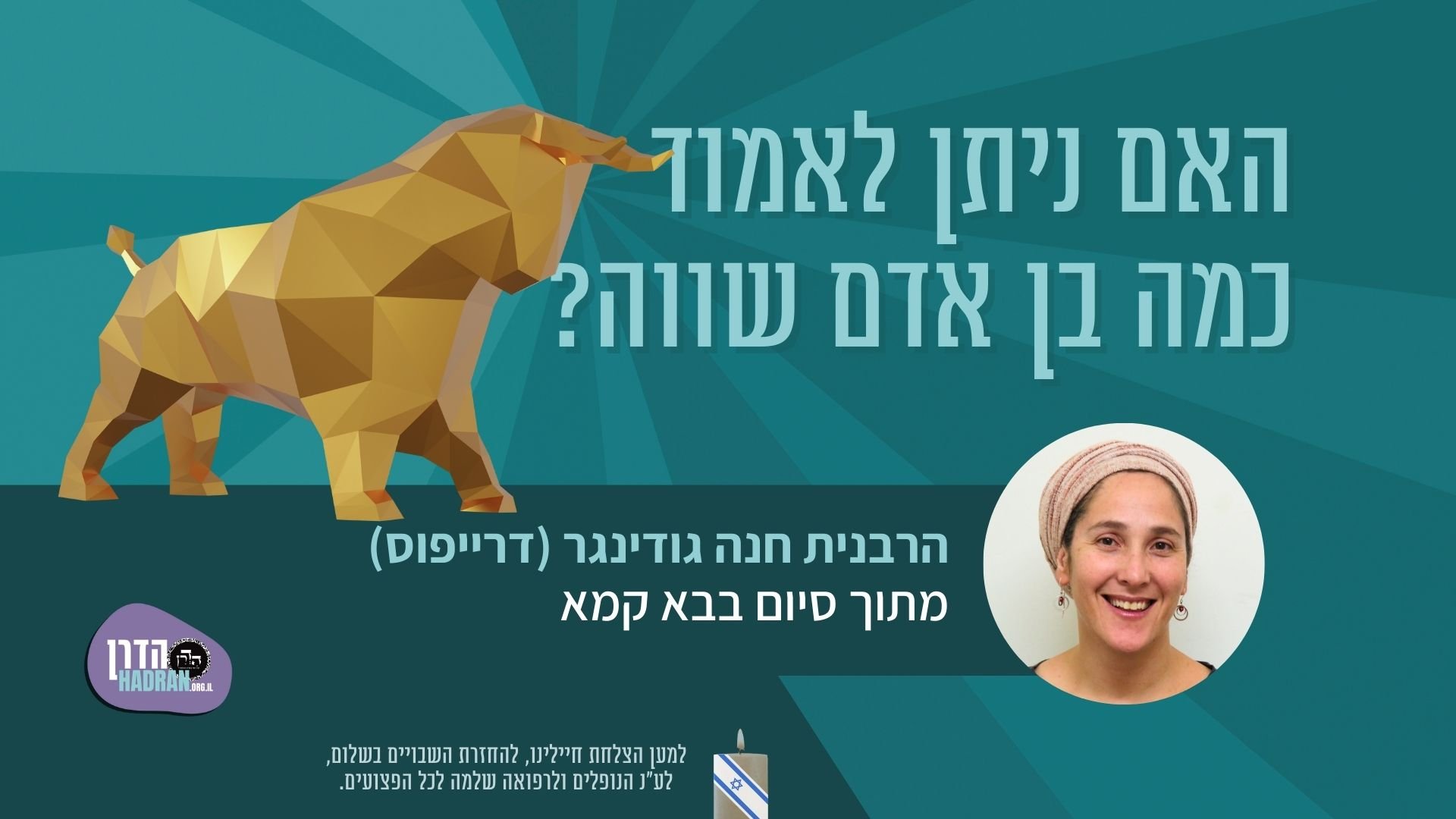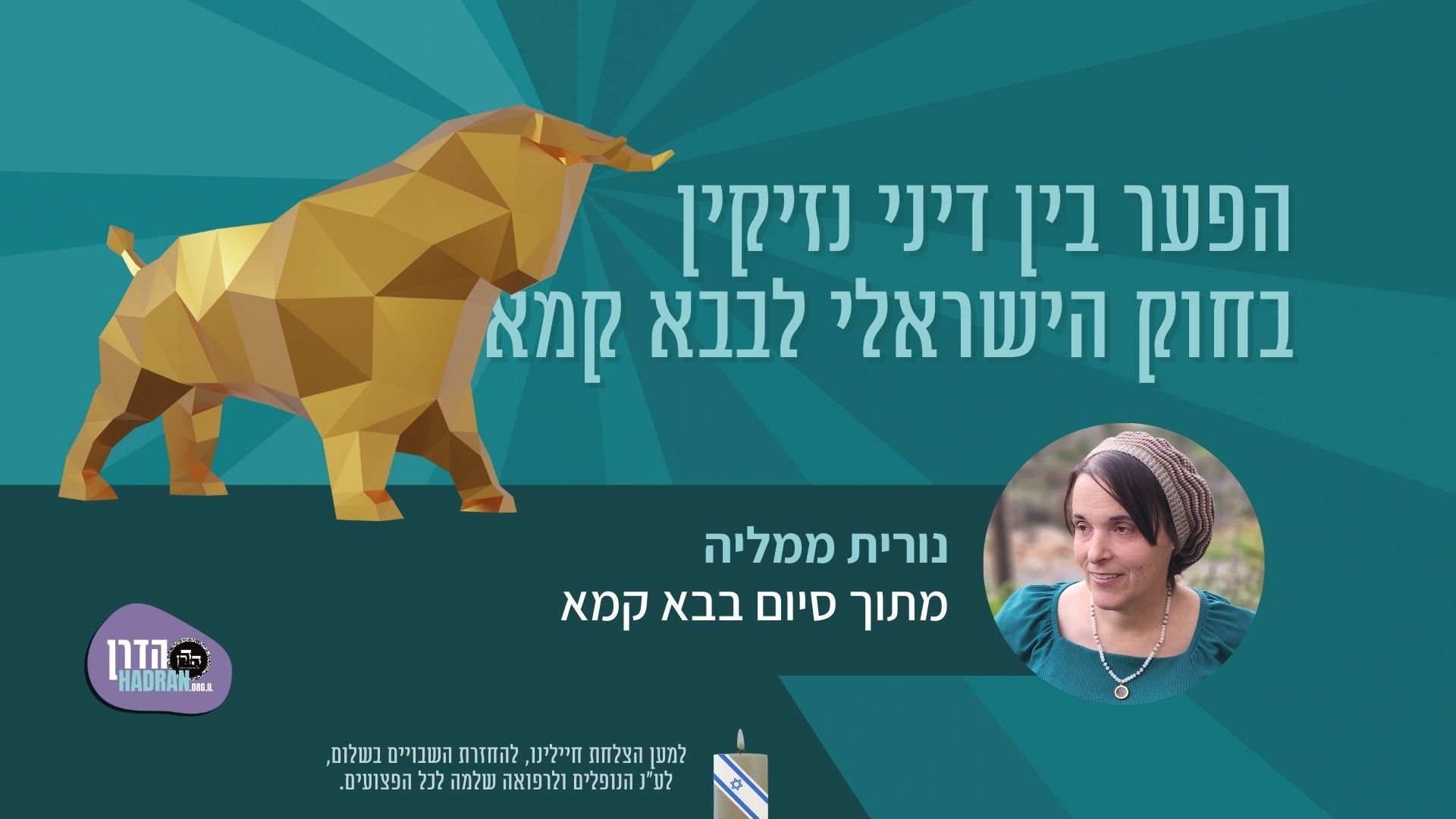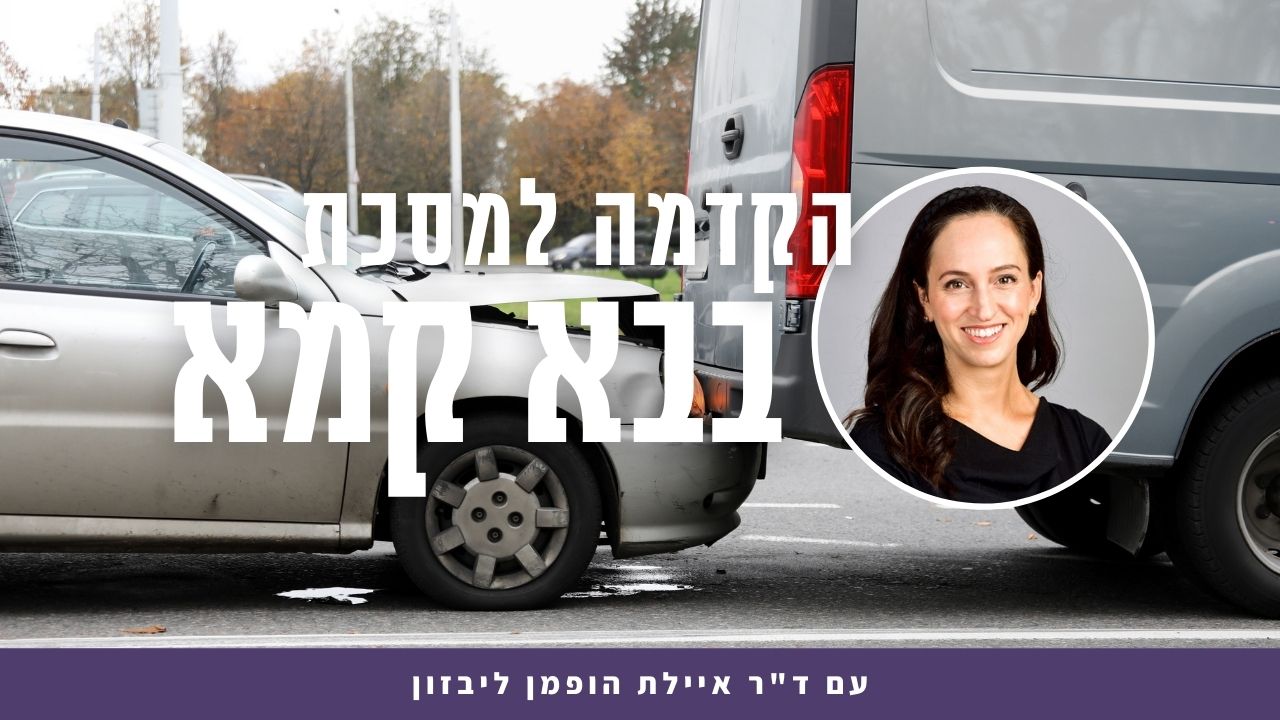בבא קמא קיח
פָּרָה רְבוּצָה בּוֹ, וּשְׁטָפָהּ נָהָר; דְּרַבִּי אֶלְעָזָר לְטַעְמֵיהּ, וְרַבָּנַן לְטַעְמַיְיהוּ.
a prone cow in it, and a river washed it away. Rabbi Elazar conforms to his standard line of reasoning, as he maintains that land is included in the category of items that are not subject to the halakhot of robbery. Consequently, the robber acquires the land and simultaneously becomes liable to return it. Since he acquires the land, he acquires the cow that is on the land as well, and is liable to compensate its owner when it gets washed away by the river. And the Rabbis conform to their standard line of reasoning, as they hold that land was excluded by the verse. Therefore, the robber does not acquire the land and also does not acquire the cow.
מַתְנִי׳ הַגּוֹזֵל אֶת חֲבֵירוֹ אוֹ שֶׁהִלְוָה הֵימֶנּוּ אוֹ שֶׁהִפְקִיד לוֹ, בַּיִּשּׁוּב – לֹא יַחֲזִיר לוֹ בַּמִּדְבָּר. עַל מְנָת לָצֵאת בַּמִּדְבָּר – יַחֲזִיר לוֹ בַּמִּדְבָּר.
MISHNA: With regard to one who robs another or who borrowed money from him, or one with whom another had deposited an item, if any of these interactions took place in a settled area, he may not return the item to him in an unsettled area, where it is of little benefit to the owner and he cannot safeguard it. If the loan or deposit was given on the condition that the recipient may go out and return it to the owner in an unsettled area, he may return it to him in an unsettled area.
גְּמָ׳ וּרְמִינְהוּ: מִלְוָה מִשְׁתַּלֶּמֶת בְּכׇל מָקוֹם, אֲבֵידָה וּפִקָּדוֹן אֵין מִשְׁתַּלְּמִין אֶלָּא בִּמְקוֹמָן! אָמַר אַבָּיֵי, הָכִי קָאָמַר: מִלְוָה נִיתְּנָה לִיתָּבַע בְּכׇל מָקוֹם, אֲבֵידָה וּפִקָּדוֹן לֹא נִיתְּנוּ לִיתָּבַע אֶלָּא בִּמְקוֹמָן.
GEMARA: The Gemara raises a contradiction to the mishna from a baraita: A loan may be repaid in any location, while a lost item and a deposit are returned only in their location, i.e., the same type of place, settled or unsettled, where they were found or received. Abaye said: This is what the baraita is saying: A loan may be claimed by the creditor in any location. Yet, if the borrower initiates the process of repaying the loan in an unsettled area, the creditor may refuse to accept the repayment until they reach a settled area. Conversely, a lost item and a deposit may be claimed only in their location.
עַל מְנָת לָצֵאת בַּמִּדְבָּר. פְּשִׁיטָא! לָא צְרִיכָא, דַּאֲמַר לֵיהּ: ״לֶיהֱוֵי הַאי פִּקָּדוֹן גַּבָּךְ, דַּאֲנָא לְמִדְבָּר נָפֵיקְנָא״, וַאֲמַר לֵיהּ אִיהוּ: ״אֲנָא לְמִדְבָּר נָמֵי בָּעֵינָא לְמִיפַּק. אִי בָּעֵינָא לְאַהְדֹּרִינְהוּ לָךְ, הָתָם מַהְדַּרְנָא לָךְ״.
The mishna teaches that if the loan or deposit was given on the condition that the recipient may go out and return it to the owner in an unsettled area, he may do so. The Gemara asks: Isn’t it obvious that an explicit stipulation to this effect is binding? The Gemara answers: No, it is necessary, as the mishna is discussing a case where the depositor said to the bailee: Let this deposit be with you, as I am going out to an unsettled area, and the bailee said to him: I also need to go out to an unsettled area, so if I need to return the deposit to you there, I will return it to you there.
מַתְנִי׳ הָאוֹמֵר לַחֲבֵירוֹ: ״גְּזַלְתִּיךָ״; ״הִלְוִיתַנִי״; ״הִפְקַדְתָּ אֶצְלִי, וְאֵינִי יוֹדֵעַ אִם הֶחְזַרְתִּי לָךְ אִם לֹא הֶחְזַרְתִּי לָךְ״ – חַיָּיב לְשַׁלֵּם. אֲבָל אִם אָמַר לוֹ: ״אֵינִי יוֹדֵעַ אִם גְּזַלְתִּיךָ״; ״אִם הִלְוִיתַנִי״; ״אִם הִפְקַדְתָּ אֶצְלִי״ – פָּטוּר מִלְּשַׁלֵּם.
MISHNA: In the case of one who says to another: I robbed you, or: You lent me money, or: You deposited an item with me, and I do not know if I returned your property to you or if I did not return it to you, he is liable to pay the sum or item in question. But if he said to him: I do not know if I robbed you, or: I do not know if you lent me money, or: I do not know if you deposited an item with me, he is exempt from paying the sum or item in question.
גְּמָ׳ אִיתְּמַר: ״מָנֶה לִי בְּיָדְךָ״, וְהַלָּה אוֹמֵר: ״אֵינִי יוֹדֵעַ״ – רַב הוּנָא וְרַב יְהוּדָה אָמְרִי: חַיָּיב, וְרַב נַחְמָן וְרַבִּי יוֹחָנָן אָמְרִי: פָּטוּר.
GEMARA: The Gemara cites a related dispute: It was stated that if one individual says to another: I have one hundred dinars in your possession, and the other says: I do not know whether or not this is true, Rav Huna and Rav Yehuda say that he is liable to pay the plaintiff, and Rav Naḥman and Rabbi Yoḥanan say that he is exempt from paying.
רַב הוּנָא וְרַב יְהוּדָה אָמְרִי חַיָּיב – בָּרִי וְשֶׁמָּא, בָּרִי עָדִיף. רַב נַחְמָן וְרַבִּי יוֹחָנָן אָמְרִי פָּטוּר – אוֹקִי מָמוֹנָא בְּחֶזְקַת מָרֵיהּ.
The Gemara explains the reason for each opinion: Rav Huna and Rav Yehuda say that he is liable to pay, because when there is a certain claim and an uncertain claim, the certain claim is superior. Rav Naḥman and Rabbi Yoḥanan say that he is exempt from paying because of the principle: Establish the money in the possession of its owner, i.e., money is not taken from one’s possession without clear proof that he is liable to pay it.
תְּנַן, אֲבָל אִם אָמַר לוֹ: ״אֵינִי יוֹדֵעַ אִם הִלְוִיתַנִי״ – פָּטוּר. הֵיכִי דָמֵי? אִילֵּימָא דְּלָא קָא תָבַע לֵיהּ – רֵישָׁא נָמֵי דְּלָא קָא תָבַע לֵיהּ; אַמַּאי חַיָּיב? אֶלָּא דְּקָתָבַע לֵיהּ, וְקָתָנֵי סֵיפָא: פָּטוּר מִלְּשַׁלֵּם!
The Gemara attempts to derive a proof: We learned in the mishna: But if he said to him: I do not know if you lent me money, he is exempt from paying. What are the circumstances? If we say that the mishna is discussing a case where the lender did not claim the money from him, the first clause must also discuss a situation where the lender did not claim the money from him. If so, why is the borrower liable to pay in the case discussed in the first clause? Rather, the mishna must be discussing a case where the lender did claim the money from him, and the latter clause nevertheless teaches that the borrower is exempt from paying, even though his claim is uncertain and that of the lender is certain. This supports the opinion of Rav Naḥman and Rabbi Yoḥanan.
לָא; לְעוֹלָם דְּלָא קָא תָבַע לֵיהּ, וְרֵישָׁא – בְּבָא לָצֵאת יְדֵי שָׁמַיִם.
The Gemara answers: No, actually the mishna is referring to a case where the lender did not claim the money from him, and the first clause is discussing a case where the borrower comes to fulfill his obligation to Heaven.
אִיתְּמַר נָמֵי, אָמַר רַבִּי חִיָּיא בַּר אַבָּא אָמַר רַבִּי יוֹחָנָן: הָאוֹמֵר לַחֲבֵירוֹ ״מָנֶה לִי בְּיָדְךָ״, וְהַלָּה אוֹמֵר ״אֵינִי יוֹדֵעַ״ – חַיָּיב, בְּבָא לָצֵאת יְדֵי שָׁמַיִם.
The Gemara adds that it was also stated: Rabbi Ḥiyya bar Abba says that Rabbi Yoḥanan says: In the case of one who says to another: I have one hundred dinars in your possession, and the other individual says: I do not know whether or not this is true, the latter is liable to pay. This applies where he comes to fulfill his obligation to Heaven even though he cannot be forced to pay. This statement is in accordance with the opinion of Rav Huna and Rav Yehuda.
מַתְנִי׳ הַגּוֹנֵב טָלֶה מִן הָעֵדֶר וְהֶחְזִירוֹ, וּמֵת אוֹ נִגְנַב – חַיָּיב בְּאַחְרָיוּתוֹ. לֹא יָדְעוּ בְּעָלִים לֹא בִּגְנֵיבָתוֹ וְלֹא בַּחֲזִירָתוֹ, וּמָנוּ אֶת הַצֹּאן וּשְׁלֵימָה הִיא – פָּטוּר.
MISHNA: In the case of one who stole a lamb from a flock and returned it without informing the owner that he had done so, and then it died or was stolen, the thief is liable to pay restitution for it. If the lamb’s owners did not know about the entire incident, i.e., they did not know that it was stolen and they did not know that it was returned, and they counted the flock of sheep and found it whole, the thief is exempt from paying.
גְּמָ׳ אָמַר רַב: לְדַעַת – צָרִיךְ דַּעַת. שֶׁלֹּא לְדַעַת – מִנְיָן פּוֹטֵר. וְכִי קָתָנֵי ״וּמָנוּ אֶת הַצֹּאן וְהִיא שְׁלֵימָה״ – אַסֵּיפָא.
GEMARA: The Gemara presents several ways to understand the mishna: Rav says: In a case where the owners had knowledge of the fact that their lamb was stolen, the thief is required to return it with the knowledge of the owners in order to be exempt from liability if the lamb is subsequently harmed. In a case where the owners had no knowledge that the lamb was taken, their count of the flock after the thief returned it exempts the thief from further liability. And when the mishna teaches: And they counted the flock of sheep and found it whole, it is referring specifically to the latter clause, i.e., the case where the owners were unaware that the lamb was stolen, as it is specifically in that case that the count exempts the thief from liability.
וּשְׁמוּאֵל אָמַר: בֵּין לְדַעַת בֵּין שֶׁלֹּא לְדַעַת – מִנְיָן פּוֹטֵר, וְכִי קָתָנֵי: ״וּמָנוּ וְהִיא שְׁלֵימָה, פָּטוּר״ – אַכּוּלַּהּ.
And Shmuel says: Whether the owners had knowledge of the theft or whether they did not have knowledge of it, their count of the flock exempts the thief from payment. And when the mishna teaches: And they counted the flock of sheep and found it whole, the thief is exempt, it is referring to the entire mishna, as this exempts the thief from liability in both cases mentioned in the mishna.
וְרַבִּי יוֹחָנָן אוֹמֵר: לְדַעַת – מִנְיָן פּוֹטֵר, שֶׁלֹּא לְדַעַת – אֲפִילּוּ מִנְיָן נָמֵי לָא צְרִיךְ. וְכִי קָתָנֵי: ״וּמָנוּ אֶת הַצֹּאן וְהִיא שְׁלֵימָה״ – אַרֵישָׁא.
And Rabbi Yoḥanan says: In a case where the owners had knowledge of the theft, their count of the flock exempts the thief, and in a case where the owners had no knowledge of the theft, even counting is not required for the thief to be exempt. And when the mishna teaches: And they counted the flock of sheep and found it whole, it is referring specifically to the first clause of the mishna, as it is particularly in that case that the count is relevant.
רַב חִסְדָּא אָמַר: לְדַעַת – מִנְיָן פּוֹטֵר, שֶׁלֹּא לְדַעַת – צָרִיךְ דַּעַת. וְכִי קָתָנֵי: ״וּמָנוּ אֶת הַצֹּאן וְהִיא שְׁלֵימָה״ – אַרֵישָׁא.
Rav Ḥisda says: In a case where the owners had knowledge of the theft, their count of the flock exempts the thief. In a case where the owners had no knowledge of the theft, the thief is required to return the lamb with their knowledge in order to become exempt from liability for future damage. And when the mishna teaches: And they counted the flock of sheep and found it whole, it is referring specifically to the first clause of the mishna, where the owners were aware of the theft, as it is only in that case that counting the flock is sufficient to exempt the thief from further liability.
אָמַר רָבָא:
Rava says:
מַאי טַעְמָא דְּרַב חִסְדָּא? הוֹאִיל וְאַנְקְטַהּ נִגְרֵי בָּרָיָיתָא.
What is the reasoning of Rav Ḥisda, who holds that the requirement to return the animal with the owner’s knowledge is in the case where the owners did not know about the theft? Since the thief taught the lamb to take steps outside, i.e., to leave the owners’ property, it will now require greater supervision, which the owners can provide only if they are aware of the situation.
וּמִי אָמַר רָבָא הָכִי? וְהָאָמַר רָבָא: הַאי מַאן דְּחַזְיֵיהּ לְחַבְרֵיהּ דְּאַגְבַּהּ אִימְּרָא מֵעֶדְרָא דִידֵיהּ, וּרְמָא בֵּיהּ קָלָא וְשַׁדְיֵיהּ, וְלָא יְדַע אִי הֲדַרָה אִי לָא הֲדַרָה, וּמֵת אוֹ נִגְנַב – חַיָּיב בְּאַחְרָיוּתוֹ.
The Gemara assumes that since Rava explained Rav Ḥisda’s reasoning, he accepts Rav Ḥisda’s ruling. The Gemara asks: But did Rava actually say this? Doesn’t Rava say that in the case of this person who saw another lift a lamb from his flock in order to steal it, and the owner then raised his voice at the thief, and the thief discarded it, but the owner did not know if the thief returned the lamb or if he did not return it, and the lamb then died or was stolen, the thief is to pay restitution for it?
מַאי, לָאו אַף עַל גַּב דִּמְנִי? לָא, דְּלָא מְנִי.
The Gemara comments: What, is this statement of Rava not applicable even if the owner counted his flock after this incident? Accordingly, Rava rules that if the owner knew about the theft, the thief is rendered exempt from liability only if he returns the lamb with the owner’s knowledge, which is not in accordance with the ruling of Rav Ḥisda. The Gemara answers: No, Rava’s ruling applies only where the owner did not count the flock.
וּמִי אָמַר רַב הָכִי? וְהָאָמַר רַב: הֶחְזִירוֹ לְעֵדֶר שֶׁבַּמִּדְבָּר – יָצָא! אָמַר רַב חָנָן בַּר אַבָּא: מוֹדֶה רַב בִּרְקוֹעָתָא.
The Gemara examines Rav’s ruling. But did Rav actually say this? Doesn’t Rav say that if the thief returned the lamb to the owner’s flock that is in an unsettled area, he has fulfilled his obligation to return it? This indicates that the thief is exempt from further liability even though the thief did not inform the owner of the lamb’s return and the owner did not count the flock. The Gemara answers that Rav Ḥanan bar Abba said: Rav concedes that the thief is exempt in this case only where the lamb was spotted [birkuata]. Since the lamb’s spots are distinctive, the owner immediately becomes aware of its return.
לֵימָא כְּתַנָּאֵי: הַגּוֹנֵב טָלֶה מִן הָעֵדֶר, וְסֶלַע מִן הַכִּיס – לִמְקוֹם שֶׁגָּנַב יַחֲזִיר, דִּבְרֵי רַבִּי יִשְׁמָעֵאל. רַבִּי עֲקִיבָא אוֹמֵר: צָרִיךְ דַּעַת בְּעָלִים.
The Gemara suggests: Let us say that the amoraic dispute cited previously is parallel to a dispute between tanna’im, as it is taught in a baraita: One who steals a lamb from a flock or a sela from a purse must return it to the place from where he stole it; this is the statement of Rabbi Yishmael. Rabbi Akiva says: The thief is required to return it with the knowledge of its owners.
סַבְרוּהָ, דְּכוּלֵּי עָלְמָא אִית לְהוּ דְּרַבִּי יִצְחָק – דְּאָמַר רַבִּי יִצְחָק: אָדָם עָשׂוּי לְמַשְׁמֵשׁ בְּכִיסוֹ בְּכׇל שָׁעָה. מַאי, לָאו בְּסֶלַע לְדַעַת – וּבִפְלוּגְתָּא דְּרַב וּשְׁמוּאֵל?
The Gemara explains: The Sages discussing the matter assumed that everyone accepts the opinion of Rabbi Yitzḥak, as Rabbi Yitzḥak says: A person is prone to feel his purse constantly, and therefore becomes aware of the theft soon after it takes place. What, is it not a case where a sela was stolen with the owner’s knowledge, and the dispute of Rabbi Yishmael and Rabbi Akiva is parallel to the dispute of Rav and Shmuel? According to this explanation, Rav rules in accordance with the opinion of Rabbi Akiva, and Shmuel rules in accordance with the opinion of Rabbi Yishmael.
לָא; בְּטָלֶה שֶׁלֹּא לְדַעַת, וּבִפְלוּגְתָּא דְּרַב חִסְדָּא וְרַבִּי יוֹחָנָן.
The Gemara responds: No, they disagree in the case of a lamb that was stolen without the knowledge of its owners, i.e., they did not know that it was stolen, and the dispute of Rabbi Yishmael and Rabbi Akiva is parallel to the dispute of Rav Ḥisda and Rabbi Yoḥanan. Rav Ḥisda rules in accordance with the opinion of Rabbi Akiva that the lamb must be returned with the owner’s knowledge, and Rabbi Yoḥanan rules in accordance with the opinion of Rabbi Yishmael that the owners do not need to become aware of the lamb’s return.
אָמַר רַב זְבִיד מִשְּׁמֵיהּ דְּרָבָא: בְּשׁוֹמֵר שֶׁגָּנַב מֵרְשׁוּת בְּעָלִים – כּוּלֵּי עָלְמָא לָא פְּלִיגִי, כִּדְרַב חִסְדָּא; וְהָכָא בְּשׁוֹמֵר שֶׁגָּנַב מֵרְשׁוּתוֹ, שֶׁיַּחֲזִיר לִמְקוֹם שֶׁגָּנַב קָמִיפַּלְגִי – רַבִּי עֲקִיבָא סָבַר: כָּלְתָה לוֹ שְׁמִירָתוֹ, וְרַבִּי יִשְׁמָעֵאל סָבַר: לֹא כָּלְתָה לוֹ שְׁמִירָתוֹ.
Rav Zevid said in the name of Rava: With regard to a bailee who stole a lamb from the owner’s domain, everyone, including Rabbi Yishmael, agrees that the halakha is in accordance with the opinion of Rav Ḥisda, and the owner must be aware of the animal’s return in order for the thief to become exempt from further liability. And here it is with regard to whether a bailee who stole from within his own domain may return what he stole to the place from where he stole it that they disagree. Rabbi Akiva holds: His safeguarding was terminated when he stole the lamb and he must therefore return it with the owner’s knowledge. And Rabbi Yishmael holds: His safeguarding was not terminated and he may return it to his own domain.
לֵימָא מִנְיָן פּוֹטֵר – תַּנָּאֵי הִיא? דְּתַנְיָא: הַגּוֹזֵל אֶת חֲבֵירוֹ, וְהִבְלִיעַ לוֹ בְּחֶשְׁבּוֹן – תָּנֵי חֲדָא: יָצָא, וְתַנְיָא אִידַּךְ: לֹא יָצָא.
The Gemara suggests: Let us say that with regard to the dispute over whether the owner’s counting of his flock exempts a thief who returned a stolen lamb without notifying the owner, it is a dispute between tanna’im, as it is taught in a baraita: With regard to one who robbed another and then included the money he owed him for the robbery in the calculation of the payment for a different transaction, i.e., he compensated the owner by overpaying him for a different transaction, it is taught in one baraita: He has fulfilled his obligation to pay, and it is taught in another baraita: He has not fulfilled his obligation to pay.
סַבְרוּהָ, דְּכוּלֵּי עָלְמָא אִית לְהוּ דְּרַבִּי יִצְחָק, דְּאָמַר: אָדָם עָשׂוּי לְמַשְׁמֵשׁ בְּכִיסוֹ בְּכׇל שָׁעָה וְשָׁעָה. מַאי, לָאו בְּהָא קָמִיפַּלְגִי – דְּמַאן דְּאָמַר יָצָא, סָבַר: מִנְיָן פּוֹטֵר; וּמַאן דְּאָמַר לֹא יָצָא, סָבַר: מִנְיָן אֵינוֹ פּוֹטֵר?
The Sages discussing the matter assumed that everyone accepts the statement of Rabbi Yitzḥak, as Rabbi Yitzḥak says: A person is prone to feel his purse constantly, and therefore becomes aware that he has been compensated soon after the payment is made. What, is it not with regard to this following point that they disagree: The one who says that the robber has fulfilled his obligation holds that the counting of the property exempts a robber from further liability, and the one who says that the robber has not fulfilled his obligation holds that the counting does not exempt a robber from further liability.
אָמְרִי: אִי סְבִירָא לַן כְּרַבִּי יִצְחָק – כּוּלֵּי עָלְמָא לָא פְּלִיגִי דְּמִנְיָן פּוֹטֵר; אֶלָּא בִּדְרַבִּי יִצְחָק קָמִיפַּלְגִי – מָר אִית לֵיהּ דְּרַבִּי יִצְחָק, וּמָר לֵית לֵיהּ דְּרַבִּי יִצְחָק.
The Gemara responds: One can say that if we held in accordance with the statement of Rabbi Yitzḥak, it would follow that everyone agrees that the counting of the property exempts a robber from further liability. Rather, it is with regard to the statement of Rabbi Yitzḥak itself that they disagree: One Sage accepts the statement of Rabbi Yitzḥak, and one Sage does not accept the statement of Rabbi Yitzḥak.
וְאִי בָּעֵית אֵימָא: דְּכוּלֵּי עָלְמָא אִית לְהוּ דְּרַבִּי יִצְחָק; וְלָא קַשְׁיָא, הָא דִּמְנִי וּרְמָא לֵיהּ בְּכִיסֵיהּ, וְהָא דִּמְנִי וּרְמָא לִידֵיהּ.
And if you wish, say instead that everyone accepts the statement of Rabbi Yitzḥak, and it is not difficult: This first baraita, which rules that the robber fulfilled his obligation, is discussing a case where the robber counted the money and placed it directly in the owner’s purse, which the owner will soon open and count. And that other baraita, which rules that the robber did not fulfill his obligation, is discussing a case where he counted the money and placed it in the owner’s hand. Consequently, it is possible that the owner will put the money directly into a container with other coins in it and will never realize that he was compensated for the theft.
וְאִיבָּעֵית אֵימָא: אִידֵּי וְאִידֵּי דִּמְנִי וּרְמָא בְּכִיסֵיהּ; הָא דְּאִית לֵיהּ זוּזֵי אַחֲרִינֵי בְּכִיסֵיהּ, הָא דְּלֵית לֵיהּ זוּזֵי אַחֲרִינֵי בְּכִיסֵיהּ.
And if you wish, say instead that both this baraita and that baraita are discussing a case where the robber counted the money and placed it in the owner’s purse. This baraita discusses a case where he has other dinars in his purse, but he did not know how many. Therefore, when he counts the money, he will not realize that the robber inserted an additional sum. Whereas that baraita is discussing a case where he does not have other dinars in his purse, so that when he counts the money he will realize that an additional sum has been included in the payment.
מַתְנִי׳ אֵין לוֹקְחִין מִן הָרוֹעִים – צֶמֶר וְחָלָב וּגְדָיִים, וְלֹא מִשּׁוֹמְרֵי פֵירוֹת – עֵצִים וּפֵירוֹת.
MISHNA: One may not purchase wool, milk, and kids from the shepherds who tend the flocks of others, due to the concern that they have stolen these items from the owners of the flocks. And similarly, one may not purchase wood and produce from produce watchmen.
אֲבָל לוֹקְחִין מִן הַנָּשִׁים – כְּלֵי צֶמֶר בִּיהוּדָה, וּכְלֵי פִשְׁתָּן בַּגָּלִיל, וַעֲגָלִים בַּשָּׁרוֹן. וְכוּלָּן שֶׁאָמְרוּ לְהַטְמִין – אָסוּר. וְלוֹקְחִין בֵּיצִים וְתַרְנְגוֹלִין מִכׇּל מָקוֹם.
But one may purchase from women woolen goods in Judea, and linen goods in the Galilee, and calves in the Sharon, as women in these locations often work with those commodities and it can be assumed that they are selling the items with the owner’s consent. And with regard to all these items, in a case where the seller told the buyer to conceal the purchase, it is prohibited, as there is good reason to suspect that the items are stolen. And one may purchase eggs and chickens from everywhere, as it is unlikely that one would steal and sell these commodities.
גְּמָ׳ תָּנוּ רַבָּנַן: אֵין לוֹקְחִין מִן הָרוֹעִים לֹא עִזִּים וְלֹא גְּדָיִים וְלֹא גִּיזִּין וְלֹא תְּלוּשִׁין שֶׁל צֶמֶר, אֲבָל לוֹקְחִין מֵהֶן תְּפוּרִין – מִפְּנֵי שֶׁהֵן שֶׁלָּהֶן. וְלוֹקְחִין מֵהֶן חָלָב וּגְבִינָה בַּמִּדְבָּר, וְלֹא בַּיִּשּׁוּב.
GEMARA: The Sages taught in a baraita (Tosefta 11:9): One may purchase from shepherds neither goats, nor kids, nor fleeces, nor torn pieces of wool, but one may purchase sewn garments from them, because they are presumed to be theirs. And one may purchase milk and cheese from them in an unsettled area, but not in a settled area.
וְלוֹקְחִין מֵהֶן אַרְבַּע וְחָמֵשׁ צֹאן, אַרְבַּע וְחָמֵשׁ גִּיזִּין; אֲבָל לֹא שְׁתֵּי צֹאן וְלֹא שְׁתֵּי גִיזִּין.
And one may purchase from them four or five sheep or four or five fleeces at a time, because it is unlikely that a shepherd would risk stealing such a significant quantity at once. But one may not purchase two sheep, and similarly, one may not purchase two fleeces at a time, as it is reasonable to assume that the shepherd would attempt to steal this amount from the owner.
רַבִּי יְהוּדָה אוֹמֵר: בַּיָּיתוֹת לוֹקְחִין מֵהֶן, מִדְבָּרִיּוֹת אֵין לוֹקְחִין מֵהֶן. כְּלָלוֹ שֶׁל דָּבָר: כֹּל שֶׁהָרוֹעֶה מוֹכֵר וּבַעַל הַבַּיִת מַרְגִּישׁ בּוֹ – לוֹקְחִין מֵהֶן, אֵין מַרְגִּישׁ בּוֹ – אֵין לוֹקְחִין מֵהֶן.
The baraita continues: Rabbi Yehuda says: One may purchase domesticated animals from them, as it is unlikely that the shepherds would steal them from their owner, who would notice if they did not return home. Conversely, one may not purchase desert, i.e., non-domesticated, animals from them, as it is more likely that a shepherd would steal these animals. The principle of the matter is that with regard to anything that the shepherd sells and the owner would perceive its absence if it were stolen, one may purchase it from them. But if the owner would not perceive its absence, one may not purchase it from them.
אָמַר מָר: לוֹקְחִין מֵהֶן אַרְבַּע וְחָמֵשׁ צֹאן, אַרְבַּע וְחָמֵשׁ גִּיזִּין. הַשְׁתָּא יֵשׁ לוֹמַר אַרְבַּע זָבְנִינַן, חָמֵשׁ מִיבַּעְיָא? אָמַר רַב חִסְדָּא: אַרְבַּע מִתּוֹךְ חָמֵשׁ. וְאִיכָּא דְּאָמְרִי, אָמַר רַב חִסְדָּא: אַרְבַּע מֵעֵדֶר קָטָן, וְחָמֵשׁ מֵעֵדֶר גָּדוֹל.
The Gemara examines the baraita: The Master said that one may purchase from them four or five sheep or four or five fleeces at a time. Now that it can be said that we may buy four sheep, as it is unlikely that the shepherd would steal such a large quantity at one time, is it necessary to state that we may buy five? The Gemara answers that Rav Ḥisda said: The meaning of the baraita is that one may purchase four sheep out of a flock consisting of five sheep, as it is reasonable to assume that the shepherd would not attempt to steal four-fifths of the owner’s flock. And there are those who say that Rav Ḥisda said as follows: Four sheep may be purchased from the shepherd of a small flock, and five may be purchased from the shepherd of a large flock.
הָא גוּפָא קַשְׁיָא – אָמְרַתְּ: ״אַרְבַּע וְחָמֵשׁ צֹאן, אַרְבַּע וְחָמֵשׁ גִיזִּין״, אַרְבַּע וְחָמֵשׁ – אִין, אֲבָל שָׁלֹשׁ – לָא; אֵימָא סֵיפָא: ״אֲבָל לֹא שְׁתֵּי צֹאן״ – הָא שָׁלֹשׁ זָבְנִינַן!
The Gemara asks another question with regard to the baraita: This matter itself is difficult, as you said in the baraita: One may purchase from them four or five sheep or four or five fleeces at a time, which indicates that purchasing four or five, yes, it is permitted, but purchasing three, no, it is prohibited. Say the latter clause: But one may not purchase two sheep. This indicates that we may purchase three sheep at a time.
לָא קַשְׁיָא; הָא בְּבָרְיָיתָא, הָא בִּכְחִישָׁתָא.
The Gemara answers that this is not difficult: This clause, which permits the purchase of three sheep, is discussing a case where the sheep are robust, and therefore the owner is more attentive to them and would notice if three were missing. Conversely, that clause, which prohibits the purchase of three sheep, is discussing a case where the sheep are frail. Consequently, the owner does not care about them as much, and it is possible that he would not notice if only three of them went missing.
רַבִּי יְהוּדָה אוֹמֵר: בַּיָּיתוֹת לוֹקְחִין מֵהֶן, מִדְבָּרִיּוֹת אֵין לוֹקְחִין מֵהֶן כּוּ׳. אִיבַּעְיָא לְהוּ: רַבִּי יְהוּדָה – אַרֵישָׁא קָאֵי, וּלְחוּמְרָא; אוֹ דִלְמָא אַסֵּיפָא קָאֵי, וּלְקוּלָּא?
The baraita teaches that Rabbi Yehuda says: One may purchase domesticated animals from them, but one may not purchase desert animals from them. A dilemma was raised before the Sages: Is the statement of Rabbi Yehuda referring to the first clause, and his statement is therefore a stringency? Or perhaps it is referring to the latter clause, and his statement is a leniency?
אַרֵישָׁא קָאֵי, וּלְחוּמְרָא – דְּאָמַר: ״לוֹקְחִין מֵהֶן אַרְבַּע וְחָמֵשׁ צֹאן״, הָנֵי מִילֵּי בַּיָּיתוֹת, אֲבָל מִדְבָּרִיּוֹת – אֲפִילּוּ אַרְבַּע וְחָמֵשׁ לֹא; אוֹ דִלְמָא אַסֵּיפָא קָאֵי, וּלְקוּלָּא – דְּאָמַר: ״אֲבָל לֹא שְׁתֵּי צֹאן וְלֹא שְׁתֵּי גִיזִּין״, הָנֵי מִילֵּי מִדְבָּרִיּוֹת, אֲבָל בַּיָּיתוֹת – שְׁתַּיִם נָמֵי לוֹקְחִין?
The Gemara elaborates: Is it referring to the first clause, and his statement is therefore a stringency, as he would be saying: One may purchase four or five sheep from them, and this statement applies only to domesticated animals, but with regard to desert animals, even four or five sheep may not be purchased? Or perhaps it is referring to the latter clause and it is a leniency, as he would be saying: But one may not purchase two sheep, and similarly, one may not purchase two fleeces, and this statement applies only to desert animals, but with regard to domesticated animals, one may purchase even two animals.
תָּא שְׁמַע: דְּתַנְיָא, רַבִּי יְהוּדָה אוֹמֵר: לוֹקְחִין בַּיָּיתוֹת מֵהֶן, וְאֵין לוֹקְחִין מֵהֶן מִדְבָּרִיּוֹת. וּבְכׇל מָקוֹם לוֹקְחִין מֵהֶן אַרְבַּע וְחָמֵשׁ צֹאן.
The Gemara presents an answer: Come and hear a resolution to the dilemma, as it is taught in a baraita that Rabbi Yehuda says: One may purchase domesticated animals from them, but one may not purchase desert animals from them. But one may always purchase four or five sheep from them.
































